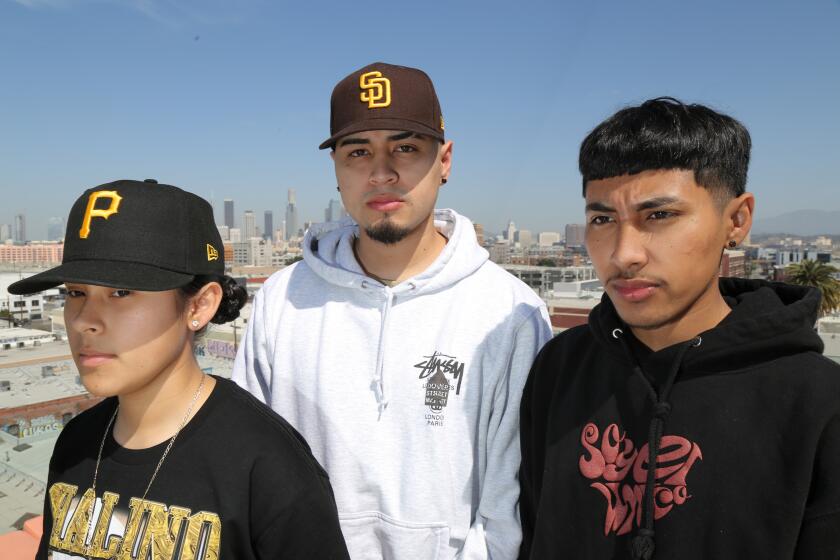
The story of the hitmaking regional Mexican band Yahritza y Su Esencia began as a modern-day American dream.
Singer-songwriter Yahritza Martínez, the youngest daughter of immigrants from Michoacán, was on the cusp of turning 15 when her performance of her original sierreño guitar ballad “Soy El Unico” went viral on TikTok last spring. Soon after, she went from playing soccer and picking fruit in the fields of Yakima, Wash., to becoming the youngest Latin artist to land a hit on the Billboard Hot 100.
For the record:
4:20 p.m. Aug. 21, 2023An earlier version of this article stated that Yahritza Martínez became the youngest artist to land a hit on the Billboard Hot 100. The singer-songwriter is the youngest Latin artist to do so.
Yahritza, now 16, and her older brothers — requinto player Armando Martínez, 25, and bajoloche player Jairo Martínez, 18 — are signed to a joint deal with regional Mexican label Lumbre Music and Columbia Records, and in 2022, they released their debut EP, “Obsessed.”
In November 2022, Yahritza y Su Esencia secured their first-ever Latin Grammy nominations in the categories of best new artist and best norteño album.
‘What motivates us every day to write songs and music is the great pride of having Mexican blood in our veins.’
By August of this year, the band was issuing apologies to the entire country of Mexico.
When I interviewed the band over a video call, they appeared onscreen from the back of a 10-passenger van, gearing up for their sold-out U.S. tour. The trio zoomed in from the parking lot of a Sally’s Beauty Store in Seattle. They were on the hunt for some shears.
“We don’t have a barber here in Seattle,” explains Armando, who quit his own post at a barbershop to play music full time. “And the tour doesn’t wait for anybody!”
It’s been a rough month for the Martínez siblings, whose comments in past interviews have caught up with them — namely, regarding their culture shock when visiting Mexico City for the first time. In January, Yahritza complained to Mexican music magazine Soy Grupero that she was jolted awake by the police sirens and the din of the traffic through the night; Armando and Jairo said they preferred their comfort foods from back home, like chicken wings, to the world-renowned cuisine of CDMX. (Jairo later told The Times with a laugh: “We needed more experience. We found really good chilaquiles and tacos before we left!”)
Led by 15-year-old Yahritza Martinez, the sibling trio Yahritza y Su Esencia have turned a pair of viral TikToks into a record-breaking single and a debut EP.
In hindsight, it was a little humorous; after all, the siblings spent the bulk of their lives in the pastoral enclave of the Yakima Valley. But it was after they shared similar sentiments on the podcast “Agushto Papa,” aired three weeks ago, that Mexican viewers began to turn on the band. “I just don’t like Mexico,” said Yahritza. “Or, I don’t feel like it’s Mexico, I feel like it’s Mexico City.”
Throughout social media, users described the band as “disrespectful” and “blonder than the Aryan gringos,” as well as “pochos.” A piñata maker in Tamaulipas made effigies of the siblings, rendering them with darker skin, loincloths and nopales on one’s head: hateful caricatures that are used to malign Indigenous people in Mexico, and are often aimed at Mexicans who are perceived to deny their heritage.
In spite of such brutal characterizations — and empathetic defenses from fans — Yahritza issued an apology on TikTok. “The whole thing was heartbreaking for us, and for our parents to see all that,” she tells The Times.
“It’s not our parents’ fault,” says Armando. “My dad always told us that Michoacán is really different from Mexico City. We’re so used to that peaceful life — no traffic, going fishing with your family — but we’re not used to the big-city lifestyle. We weren’t prepared for it, and now, we’re learning from it.”
Due to their family’s mixed immigration status, the younger siblings never spent time in Mexico prior to this string of interviews. Born in Michoacán, Armando immigrated with his older sister and parents when he was just 3 years old and remained undocumented throughout his youth. This year, Armando acquired an O-1 visa: a temporary work visa reserved for “individuals with an extraordinary ability in the arts,” among other disciplines.
And yet in 2022, at the height of the band’s popularity, Armando had to leave the U.S. and wait for his documents in Mexico City. “They gave me two days to leave,” he says. “I packed for a week. I was there for seven months.”
While the trio’s main draw has been its lead singer, Yahritza, it’s Armando who serves as the siblings’ north star. Without Armando at home to guide his siblings through their songwriting, the demands of the music industry or life in general, the group grew increasingly unmoored. “I had to Facetime Mando because I couldn’t figure out the chords for a song,” says Yahritza. “I was so lost, because we’d always work as a team. And when we’d see him, it would hurt for us to leave our brother behind.”
Armando spent those months holed up in a small apartment in the Polanco neighborhood of Mexico City, only meeting up with a handful of locals he chatted with on TikTok. Feelings of hopelessness set in when he missed the band’s inaugural appearance at the Latin Grammys in November.
By the fourth month of Armando’s exile, Yahritza and Jairo finally flew to Mexico City in January to meet him. Within their first 24 hours in the bustling metropolis, they sidelined their feelings and powered through press appearances, including the infamous chat with Soy Grupero. They realize now that their experience of Mexico was soured by their circumstances. “We kept thinking, we didn’t know when we’d see [Armando] again,” says Jairo.
As any immigrant can tell you, the person one is before they cross a border does not magically disappear in their newfound home, including their likes, dislikes and traditions. Latinos like the Martínez family — many of whom have risked discrimination, violence and even death at the border — must then contend with the nativist agendas of politicians and their supporters, who force assimilation and cultural erasure through mandating English-only policies in schools and workplaces, or by enforcing varying levels of family separation, like the kind Armando faced earlier this year. As a direct result of these traumatic experiences, “Mexican immigrants and their families present disproportionate levels of mental health illness,” writes Maria Castañeda Soria for Mitú.
“I didn’t get to choose where I was born,” says Armando, who returned to the U.S. with his visa in April. “I didn’t get the choice to immigrate to the U.S. That’s what confuses me. It confuses my siblings as well, because they were born in the U.S. You can’t force anyone to like or do anything because of their race.”
The backlash against the band is hardly unique to their interviews; despite belonging to a tightknit, majority Mexican community in Central Washington, Armando recounts past moments of unbelonging, coming mostly from fellow Mexicans. “So many kids get bullied just for not being able to speak Spanish right — or they get bullied for being too Mexican in the U.S.,” he says. “Even artists get that type of energy. You don’t know where you belong.”
This discourse has complicated regional Mexican music’s commercial renaissance, which has been most evident in the genre’s performance in the international pop charts. Some of the industry’s biggest success stories belong to artists born and raised in the U.S.: Take the members of Grupo Frontera, Fuerza Regida and Eslabón Armado.
It’s also significant that Mexican-born stars, like Natanael Cano and Peso Pluma, have signed to labels like Rancho Humilde and Prajin Music, which are based in the U.S. These artists have gone on to perform for massive crowds throughout the States, even in its sleepiest rural towns, largely thanks to immigrants and their children who are eager to stay connected to Mexico from afar.
And however much fun it is to proudly represent your ancestral lands with a flag decal on your car, or a soccer jersey on your back, the staunch nationalism exhibited in both the U.S. and Latin America is growing out of step with increasing migration and the resulting cultural hybridism. This fusion of cultures is not just reflected in the artistic output of Latin artists today, but also in the commercial behavior of their listeners; currently, Apple Music’s Top 25 song chart in Los Angeles is nearly identical to that of Mexico City’s.
Meanwhile, anglophone acts like Coldplay, My Chemical Romance and most recently Taylor Swift have all sold out tours in Mexico within hours, even minutes in some cases. Are their Mexican fans any less Mexican for consuming English-language music?
While the vitriol continues to circulate online, in real life, Yahritza y Su Esencia keep on winning. Earlier this year they bought their parents a house in rural Washington; and this week, “Fragíl,” their collaborative cumbia track with Texas band Grupo Frontera, rose to No. 1 on the Billboard Latin Airplay chart.
Now, as Yahritza y Su Esencia embark on their U.S. tour, the group is reckoning with their bicultural ambiguity by committing even harder to the Mexican folk tradition they fell in love with so long ago. They also hope that sharing their stories will help others like them — immigrants and kids in mixed-status households — to feel seen and validated.
“We love Mexican culture,” says Yahritza. “I feel it in how family is so important to us, and how hardworking we really are as people. Being able to call ourselves Mexican is the best thing. It’s an honor.”
More to Read
The Latinx experience chronicled
Get the Latinx Files newsletter for stories that capture the multitudes within our communities.
You may occasionally receive promotional content from the Los Angeles Times.










